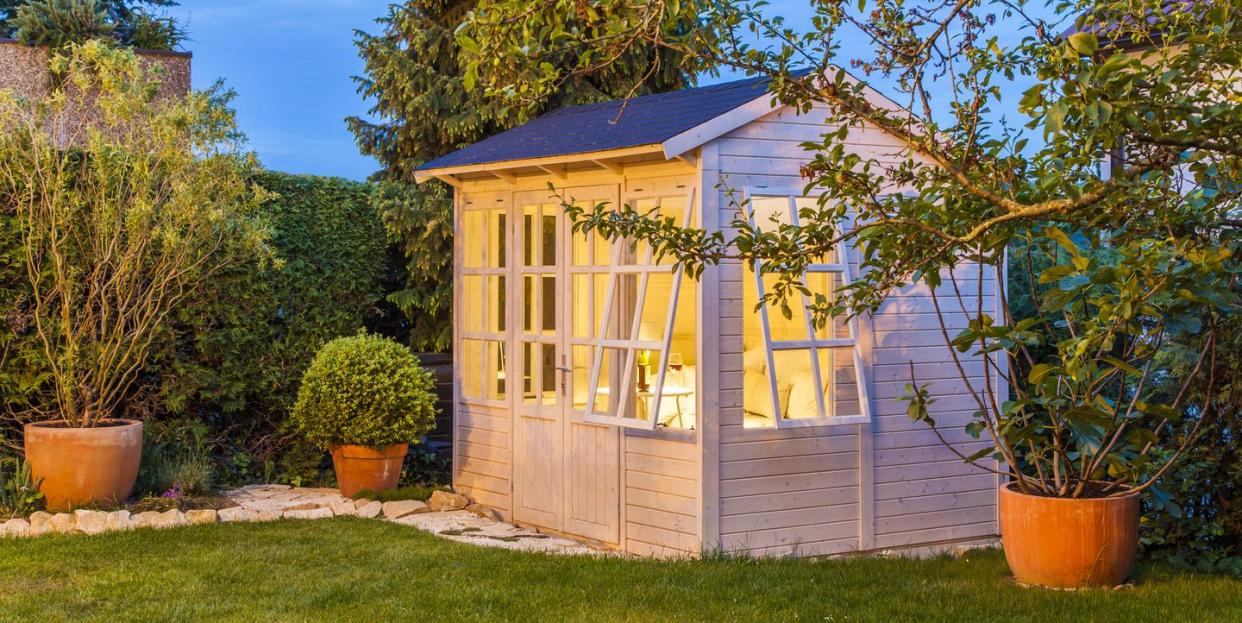Why Are We So Obsessed With Backyard Guest Houses?

Last spring, House Beautiful published a story that would, to put it mildly, knock our socks off. The article in question was about a certain guest house, made by the company Allwood, which was available for purchase on Amazon. Our editors were intrigued by the idea of buying and building a guest house so easily, and figured our readers would be too—but we had no idea just how intrigued. The story quickly went viral, racking up over 2 million views and prompting dozens of other outlets to cover the product, which soon sold out (and was subsequently restocked).

And while the "buy it yourself on Amazon" element of this particular house might be part of its appeal, the fixation on secondary structures—for work, gardening, dining, guests, or even, fine, the "she shed," if you must call it that—exists at all levels of the design industry.
Just look at the poolhouse that designer Ruard Veltman conceived for one North Carolina family, with a thatched roof woven by an Irish master over the course of three months.
"We are out here year-round," says Candy Bing of the structure, which quickly became her family's favorite "room." The same can be said for a guesthouse that architect Stephen Sutro and designer Jennifer Robin devised for a California family, with the intent of creating a vacation experience right in their yard.
And while escapism with family and friends is all well and good, many enthusiastic owners of outbuildings love them for the solitude they afford. That was the case for a combination office/guest house which architect Ryan Street devised for clients in Austin, Texas. In addition to "a guest bedroom where visiting family and friends can retreat in comfort," the architect says, "the homeowner works from home and requested a place where they could get away from the activity of the house; a quiet environment that shares a distinct connection to the natural beauty of this Austin estate."
Allison Carabasi echoes the sentiments of Street's client: "For me personally, I felt like it was my own little refuge, my own little place for me to go," says Carabisi, who built a secondary structure on her property over a decade ago, a decision she has since parlayed into a business. "It was just so fun being in that house, away from the house."

Carabasi runs the Pennsylvania-based Hillbrook Collections, which designs charming "garden houses" for clients across the country. And while her structures are inspired by the follies (architecturally playful structures within a landscape design) of English gardens, they serve a multitude of purposes: guest house, garden shed, home office, art studio—you name it.
All of Hillbrook’s structures are made by hand by an Amish community known for its handicraft. They start a little under $8,000 and increase based on customizations—which run the stylistic and functional gamut. Some people design structures to match their houses, some opt for contrast; some top them with pergolas, others with finials or weather vanes.
The concept of the guest house as part of the landscape is another big part of its appeal to many design-minded owners. "They are big art collectors, and we wanted something that was almost a piece of art to be a visual stopping point at the end of the pool," says Veltman of the origins for his North Carolina structure. "And what is the appropriate art in this case? It's architecture."

Street views his creation similarly: "In addition to serving as a peaceful retreat from the daily activity of home, these separate, smaller structures offer a new point of view and unique experience of the property," he says. "Many become a special feature within the landscape, in this case, a folly that can be viewed and enjoyed from the main house."
"In England, follies are very common, and in America I think the interest is just beginning to increase," predicts Carabasi. She also sees a likely increase in these kinds of extra spaces in light of the coronavirus pandemic, and the stay-at-home orders across the U.S. that resulted in a new wave of working from home. "I got a lot of calls for offices this spring," she says.
There’s evidence to suggest that adding a back house—when done smartly—is a sound financial decision, too. "I've since moved from the property where I built my first one, and to be honest with you, the guy that bought our house said, 'this is one of the reasons why we bought this house,'" Carabasi recalls.

And as working from home becomes more normalized in a post-coronavirus and increasingly virtual workforce, many developers and realtors predict home offices being a big draw for buyers. For those with more fully-equipped guest houses, these structures can also become rental properties that provide a secondary income (like for this Australian single mom).
Or, they can simply provide a necessary bit of tranquility. As Carabasi says of her structures, "They're just such a happy product." No wonder we can't get enough.
You Might Also Like